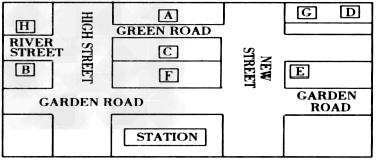任务型阅读。
Dear Linda,
Thanks for your letter. I'm glad to hear you can come on Sunday. When you drive over to my house,
it's easy to find the station. It's a little difficult after that. So here are some instructions(说明): Drive past the station. Don't turn left into Garden Road. Just go along New Street. There's a football ground on your left. Go straight ahead, past the bank, and turn left into Green Road. Turn left again into High Street. River
Street is the first on the right. My house is on the right, across from a school.
See you on Sunday!
Love,
Ann
A) 阅读这封信,在下面的地图上找出从火车站到Ann家的路线。并将表示她的寓所、足球场、银行和学校的序号写在横线上。

1. 在图中标出行走路线,用箭头指向Ann的寓所。
2. Ann's house: __________
3. Football ground: __________
4. Bank: __________
5. School: __________
B) 根据信的内容,回答下列问题。
6. Who's the letter from?
__________________________________________________________________
7. When will Linda visit Ann?
__________________________________________________________________
8. Who doesn't live in River Street, Ann or Linda?
__________________________________________________________________
9. Is it easy or difficult to find the station?
__________________________________________________________________
10. How will Linda get to Ann's house?
__________________________________________________________________
1. 略 2-5 HFCB
6. It's from Ann. /Ann. /From Ann.
7. On Sunday.
8. Linda doesn't. /Linda.
9. It's easy.
10. By car. /In her car.(6-10答案不唯一)
